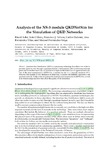Mostrar o rexistro simple do ítem
Analysis of the NS-3 module QKDNetSim for the Simulation of QKD Networks
| dc.contributor.author | Soler, David | |
| dc.contributor.author | Cillero Seijas, Iván | |
| dc.contributor.author | Nóvoa, Francisco | |
| dc.contributor.author | Dafonte, Carlos | |
| dc.contributor.author | Fernández Vilas, Ana | |
| dc.contributor.author | Fernández Veiga, Manuel | |
| dc.date.accessioned | 2023-11-15T14:36:52Z | |
| dc.date.available | 2023-11-15T14:36:52Z | |
| dc.date.issued | 2023 | |
| dc.identifier.uri | http://hdl.handle.net/2183/34234 | |
| dc.description | Cursos e Congresos, C-155 | es_ES |
| dc.description.abstract | [Abstract] Quantum Key Distribution (QKD) is a promising technology that allows two nodes to privately agree on a key through a quantum channel. Unfortunately, QKD is still in experimental phase and researchers must rely on simulators to replicate the behaviour of a quantum network. One of the most widespread is QKDNetSim, a module for the C++ network simulator NS-3. However, this module is very limited in its behaviour, so it does not faithfully represent a real quantum network. In this work we analyse the structure and components of QKDNetSim, as well as its shortcomings and how they affect the quality of the simulation | es_ES |
| dc.description.sponsorship | This work is part of the project TED2021-130369B-C31, TED2021-130369BC32, TED2021-130369B-C33 and TED2021-130492B-C21 funded by MCIN/AEI/10.13039/501100011033 and by “ERDF A way of making Europe”. The work is also funded by the Plan Complementario de Comunicaciones Cuánticas, Spanish Ministry of Science and Innovation (MICINN), Plan de Recuperación NextGenerationEU de la Unión Europea (PRTR-C17.I1, CITIC Ref. 305.2022), and Regional Government of Galicia (Agencia Gallega de Innovación, GAIN, CITIC Ref. 306.2022) | |
| dc.language.iso | eng | es_ES |
| dc.publisher | Universidade da Coruña, Servizo de Publicacións | es_ES |
| dc.relation | info:eu-repo/grantAgreement/AEI/Plan Estatal de Investigación Científica y Técnica y de Innovación 2021-2023/TED2021-130369B-C31/ES/QUANTUM-BASED RESISTANT ARCHITECTURES AND TECHNIQUES. QKD BASED ON SDN | es_ES |
| dc.relation | info:eu-repo/grantAgreement/AEI/Plan Estatal de Investigación Científica y Técnica y de Innovación 2021-2023/TED2021-130369B-C32/ES/ | es_ES |
| dc.relation | info:eu-repo/grantAgreement/AEI/Plan Estatal de Investigación Científica y Técnica y de Innovación 2021-2023/TED2021-130369B-C33/ES/ | es_ES |
| dc.relation | info:eu-repo/grantAgreement/AEI/Plan Estatal de Investigación Científica y Técnica y de Innovación 2021-2023/TED2021-130492B-C21/ES/DESARROLLO DE UNA TECNOLOGÍA DE IA PARA LA AUTENTICACIÓN DE USUARIOS BASADA EN EL COMPORTAMIENTO | es_ES |
| dc.relation.uri | https://doi.org/10.17979/spudc.000024.20 | |
| dc.rights | Attribution 4.0 International (CC BY 4.0) | es_ES |
| dc.rights.uri | https://creativecommons.org/licenses/by/4.0/deed.es | * |
| dc.subject | Computación cuántica | es_ES |
| dc.subject | Criptografía cuántica | es_ES |
| dc.subject | QKDNetSim | es_ES |
| dc.title | Analysis of the NS-3 module QKDNetSim for the Simulation of QKD Networks | es_ES |
| dc.type | info:eu-repo/semantics/conferenceObject | es_ES |
| dc.type | info:eu-repo/semantics/conferenceObject | es_ES |
| dc.rights.access | info:eu-repo/semantics/openAccess | es_ES |
| UDC.startPage | 121 | es_ES |
| UDC.endPage | 127 | es_ES |
| UDC.conferenceTitle | VI Congreso Xove TIC: impulsando el talento científico. Octubre, 2023, A Coruña | es_ES |






